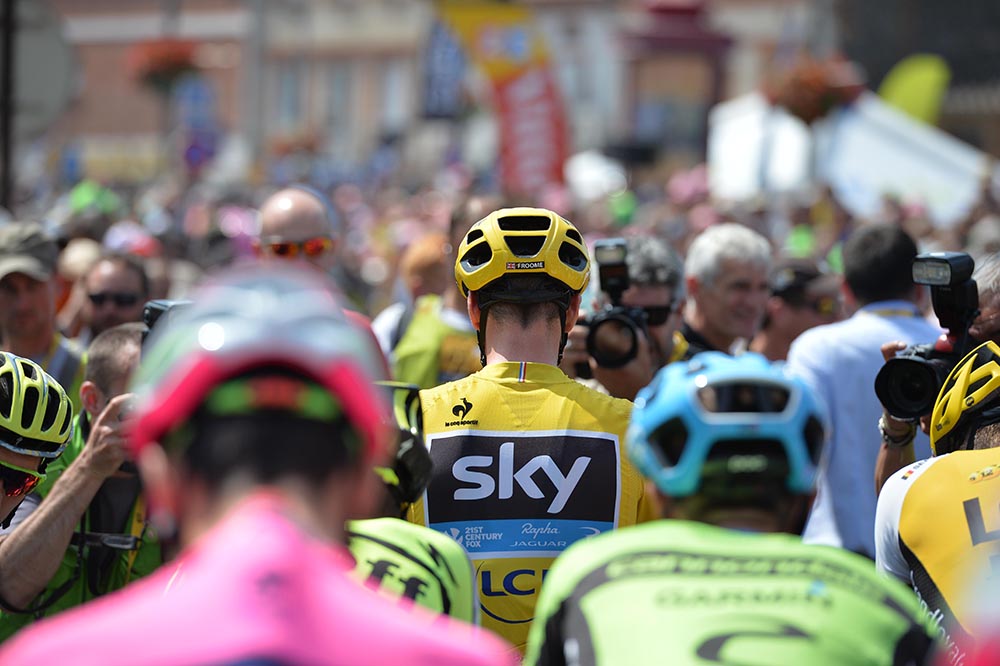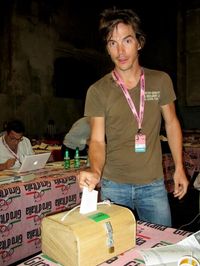Tour de France organisers to introduce grid style start for short stage 17
Riders will be ranked in groups according to the general classification for the start of the 65km mountain stage

Yellow jersey holder Chris Froome awaits the start at the Tour de France (Sunada)

The 2018 Tour de France will put a unique spin on the start of the 17th stage, one of the shortest ever 65 kilometres, that is bound to add an extra layer of difficulty to what should be a stressful day. It will place riders in grids according to their rankings at the start and eliminate the neutral zone.
The "special feature" appears in the Tour's rulebook just for stage 17. The stage travels through the Pyrenees, staring in Bagnères-de-Luchon, covering the Col de Peyresourde and the Val Louron-Azet before finishing up the Col du Portet.
"At kilometre zero, riders shall be positioned in the same order as the general classification after the previous stage," reads article 17.
"They shall be distributed into five different groups. The first 20 riders in the general classification shall be included in the first group in offset rows with the wearer of the yellow jersey in first place. Riders shall then position themselves freely in the other groups corresponding to their places in the general classification."
The stage is the shortest road stage in the last 30 years so positioning at the start could be crucial for the stage win and overall fight with Paris less than a week away.
"We will only use it that day," Thierry Gouvenou, technical director of ASO told Marca. "We believe that at such a short stage the tension can be cut with a knife and that this start formula will accentuate this situation."
It is uncertain how much space will be between the groups when the organiser lines them on the starting road. The details will be finalised in the next four weeks before the Tour starts.
The latest race content, interviews, features, reviews and expert buying guides, direct to your inbox!
When the race starts, it will be at top speed without the usual one- to 10-kilometre neutralised zone when the riders parade through town and find their positions before the official kilometre zero.
Team Sky's Chris Froome will be aiming for a fifth Tour de France title, though he and others will be worried with the short and explosive 118.5-kilometre Formigal stage of the Vuelta a España fresh on their minds.
That day in 2016, Alberto Contador and Nairo Quintana turned the race on its head with an attack from nearly kilometre zero. Quintana added over 2-30 minutes to Froome and eventually won the Vuelta.
Other short stages recently sparked fear in the peloton. In 2017, the Tour's 101-kilometre stage to Foix, riders broke free immediately and Alberto Contador launched a long-range attack at 65 kilometres remaining.
Stage 17 covers only 65 kilometres, and 43 of those will be spent climbing.
The 1996 Tour featured a 46-kilometre stage, but that was only when the organiser cut the distance due to snow. This is the shortest planned stage since the split road stages in 1985.
"I appreciate any effort to try to add something new to our sport, but honestly I do not know what I will think after the stage," Team Movistar's general manager, Eusebio Unzué told Marca.
"You have to see the exact distance between one row and another, but I don't think there will be very big differences, the only thing that will happen is that the squad will be stretched out instead of together, and little else, although we must see what the concrete distances are," Imanol Erviti (Movistar) said.
"Two metres are not the same as 20 meters, which I don't think would be appropriate."
"I don't think it will change that much," Nibali's coach and Bahrain-Maerida sports director, Paolo Slongo said. "But someone who has team-mates close by will benefit if there is an attack from the start. I think, for example, that Froome with Sky will have a mega-team."

Thank you for reading 20 articles this month* Join now for unlimited access
Enjoy your first month for just £1 / $1 / €1
*Read 5 free articles per month without a subscription

Join now for unlimited access
Try first month for just £1 / $1 / €1
Gregor Brown is an experienced cycling journalist, based in Florence, Italy. He has covered races all over the world for over a decade - following the Giro, Tour de France, and every major race since 2006. His love of cycling began with freestyle and BMX, before the 1998 Tour de France led him to a deep appreciation of the road racing season.
